Jam
Session
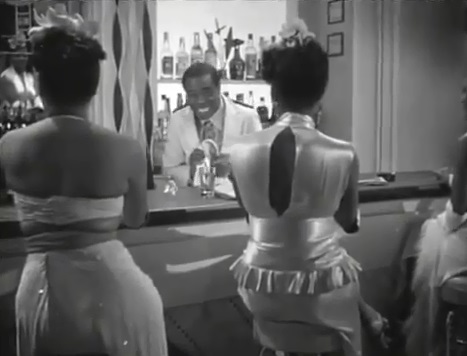
The magazine
writer from New York and the hoofer from Waterfall, Kansas (no doubt remembered
by Hitchcock in Vertigo) meet at Superba Studio for this very Jam Session eventually, with reference to The Goldwyn Follies (dir. George Marshall) in the studio head (his
partner is Mr. Marley “after all these years!”) who goes amongst
the people, “helps me to keep my finger on the national pulse.”
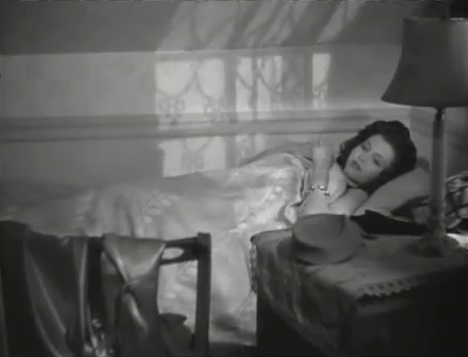
“I see,”
says he, “a light frothy
something. Boy and girl, romance, a little comedy, and
lots of music.”
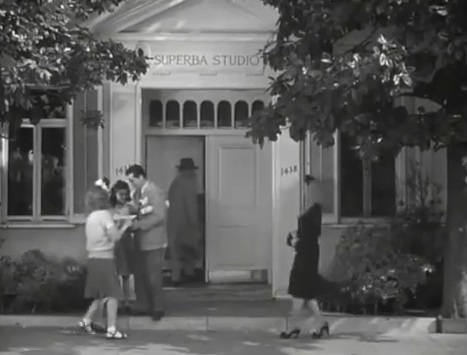
Wartime Hollywood
is compared to Washington in its lack of accommodations (cf. George Stevens’ The
More the Merrier). “Maybe a little music’d cheer ya up.”
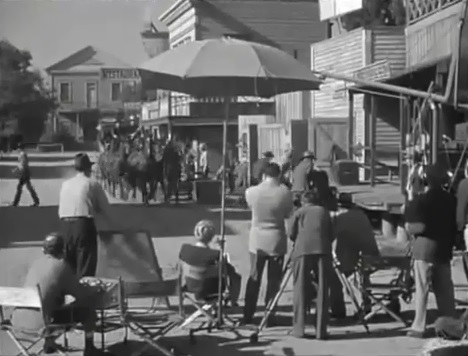
Question of
composing “entertainment without problems” around Superba footage of the great bands (no music on the stands
as a rule, emulated by Altman in Swing ‘34),
Charlie Barnet (among whose personnel is Ralph Burns, piano, in the forest primeval
for “Cherokee” on a Bluebird record played by an agent), Louis
Armstrong behind the bar and out in front, Alvino Rey (white tie and steel guitar), Jan Garber (with Helen Englert), Teddy Powell (with Peggy Mann), Glen Gray and his
Casa Loma Orchestra (“No Name Jive” at Danceland,
where the writer goes for research with his “secretary”, the hoofer
with a nom de plume) et al., Al ain’t here, he’s aroun’ inna back widda Pied Pipers, “right here on the Moviola.”
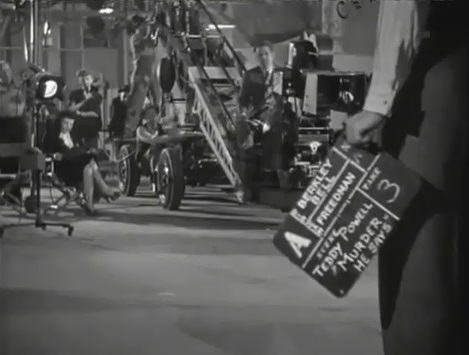
“The human brain
is an unpredictable mechanism,” says the writer. The
studio head’s assistant secretary brushes off the hoofer and her letter
of introduction from a local “movie critic”, the contest winner
sees her chance and climbs aboard a stagecoach for a shot. “I’ve
got an office full of blank sheets of paper that keep saying ‘write on
me, brother, write on me.’” A great
picture of Hollywood at work (camera truck, crane for “Mr. Berkley Bell, boss
of everything Terpischorean”,
screening room, editing room, prop room, Mr. Coletti “the
best makeup man in town”, screen test) and no mistake, the meeting of the
minds is a thing of genius (cf. Kazan’s
The Last Tycoon), it ain’t easy,
“there are more great dancers in California than oranges, but a competent
secretary is hard to find” (cf.
Lloyd Bacon’s Footlight Parade,
from the same screenwriter and two others). “Into the valley of
orchestras walked the brave writer—I wonder what size straitjacket I
wear.”
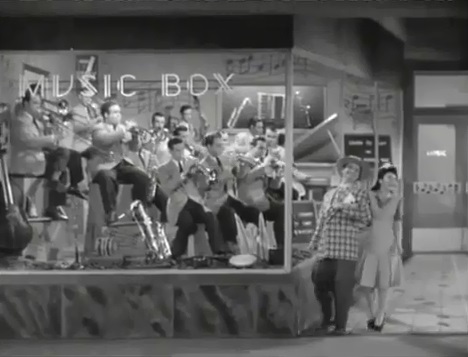
“Could be, I’ve never taken
Hollywood dictation before.”
“Authors are all alike, I tell ya, only some weigh more than others.” Nan Wynn
downtown in “Brazil”, where the gold-digging
agents come from.
Top musicianship
is the sine qua non, top terping as Variety
says, top moviemaking. “Complete tour for a
dollar, ten famous stars, only ten cents a star.” Newspaper
headline, “Ocean at Last Yields Its Gold and Its Silver”.
The one and only
problem is addressed by the women in the war plants and all the Allied soldiers
and all the girls back home around the world dancing the “Vict’ry Polka”.
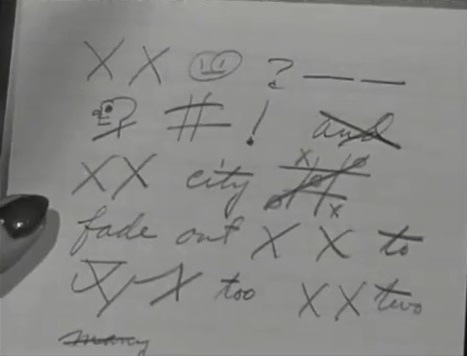
P.P.K. of the New York Times, “painless even to
the point of pleasurable.” Leonard Maltin, “mild”. TV Guide, “just an excuse to allow
some swing bands a chance to play.” Hal Erickson
(All Movie Guide), “brisk”.
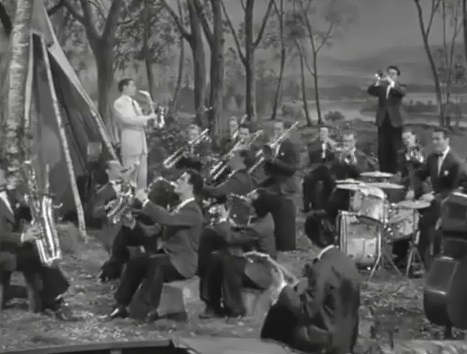
The Noose Hangs High
Gambler A owes
bookie, who owes Gambler B. Two window-washers are mistaken for messengers and
sent to pick up the dough from A, who’s a sore loser. Fleeing his goons,
the boys hit on an office mailroom, tuck the money away in an envelope, and
mail it to the bookie, who’s also a sore loser. It goes astray before it
ever leaves the mailroom, the recipient is a
matron’s personal secretary, who spends the small fortune at once.
Rearranged from a
Rogell film, with various numbers and routines served
up in a vivid language most expressive. Not logic, as Niels
Bohr would say, but thought.
Abbott & Costello Meet Frankenstein
Canonical, ominous,
comical and no spoof (cf. Mel Brooks’
Dracula: Dead and Loving It). The theme is set
forth out of Siodmak’s Son of Dracula and Kenton’s House
of Dracula.
From these
considerations, a likely brain is sought for the monster in Florida, a brain
less willful, more tractable. Count Dracula has a lady doctor there who has
conned the pages of Dr. Frankenstein’s book, The Secrets of Life and
Death.
The heroes are
shipping clerks put wise by Lawrence Talbot, a sympathetic, suffering figure
before moonrise. As the Wolf Man, he leaps from a balcony of Dr. Mornay’s island castle to seize the fleeing bat that
is Count Dracula and plunge with it into the rocky surf below.
Africa Screams
A safari into
darkest Abbott & Costello, a far-off cousin of Call Me Bwana (dir. Gordon Douglas), and a voyage
back to their roots (or some of them anyway).
There’s a
West African folk tale known as “Anansi’s
Fishing Trip”, which you may know in a somewhat stiff translation, but
looked at more closely it’s a very familiar piece of business.
ANANSI:
You want me to take these fish and sell them in town?
ANENE: Naturally, and I’ll sell whatever we catch tomorrow.
ANANSI: Hah! You must think I’m a complete idiot. You take these fish and
sell them in town, and I’ll sell all the fish we catch tomorrow.
ANENE: I don’t want to cheat you, you want me to take these fish and sell
them in town?
A precise,
surreal comedy on love and money. A lady wants diamonds, yet pretends to be
after big cats and the orangutang gargantua.
Cannibals lay diamonds down as bait for greedy hunters.
The true orangutang gargantua or
his lesser primate cousin quells the cannibals, keeps the diamonds, builds a
skyscraper in New York with his name on it, and hires the greedy fool as his
elevator operator.
Frank Buck and
Clyde Beatty assist the hunt, Max Baer and Buddy Baer
are the lady’s Kafkaesque henchmen, suddenly appearing at the book
counter of Klopper’s Department Store to begin
the adventure.
The Roman roots
of Abbott & Costello are also seen or suggested in a variant of Shaw’s
Androcles and the Lion (dir. Chester Erskine, subsequently).
Dance With Me, Henry
Bud and Lou are
partners in Kiddyland. Bud plays the horses,
he’s in to Big Frank for ten grand. Lou takes in
strays, two orphans, an old lady, and a dog named Dogface, the Welfare Board is
watching him.
The foster
daughter, a well-trained soprano, cuts a record of the title song with a local
bebopper in Kiddyland’s 50¢ recording booth.
A giuoco delle coppie with a second record, Big Frank’s
confession (bank holdup, dead D.A.). The Guiding Light Orphanage gets a new
wing, Big Frank and his gang go to jail.
The furioso plot
complications and miniature scale have simply proven to be too much for the
critics, who missed Lou sunning himself in the hot light of a third degree, and
Bud’s remark to a dead mobster he thought for a moment had shot him,
“mister, that’s the worst aim I’ve ever seen.”
His Highness the Dog
Petticoat Junction
Hamlet, etc.,
“the most valuable dog in the advertising medium,” not bright but
looks good reading idiot cards.
The girls’
dog takes it on the lam, then fetches the poor rich
beast home.
Barton has a
lark.